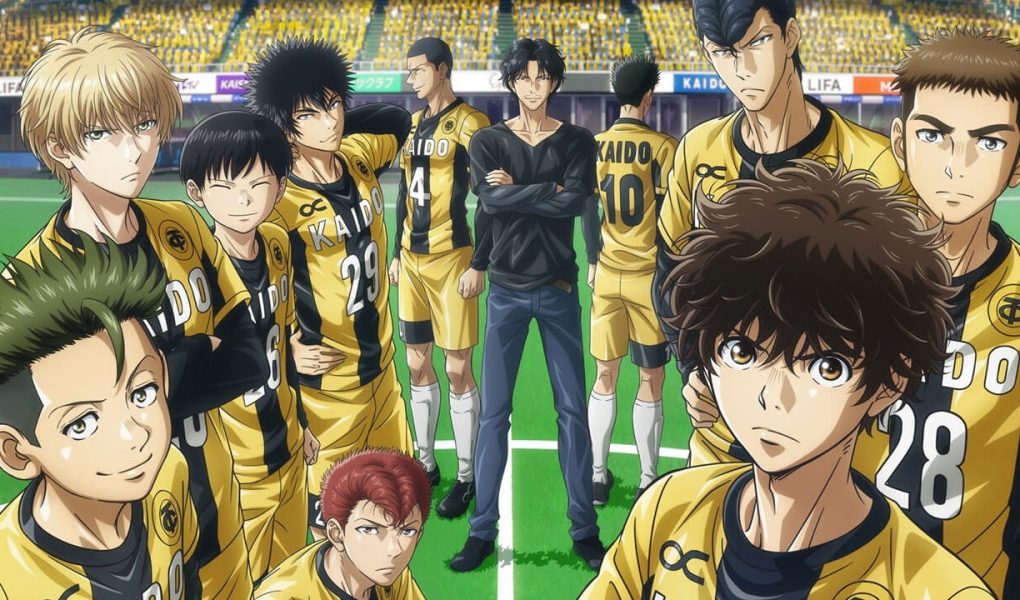


 The details of the beautiful game are never far from the mind of Ao Ashi, and this episode is no exception. It does take a step back from the laser focus of last week, though, and spotlight characters and themes that have been sidelined for a bit. Really good sports anime really would work better as hourlong drama, I think – 23 minutes never feels like enough time. There’s always something interesting about to happen, and so many elements that go into determining just how it will play out.
The details of the beautiful game are never far from the mind of Ao Ashi, and this episode is no exception. It does take a step back from the laser focus of last week, though, and spotlight characters and themes that have been sidelined for a bit. Really good sports anime really would work better as hourlong drama, I think – 23 minutes never feels like enough time. There’s always something interesting about to happen, and so many elements that go into determining just how it will play out.
 First of all, Kuribayashi is central to a lot of what happens this week. In the first place he tracks down Hana at last, and asks her to design a menu for him as she’s done for Ashito. She’s quite pleased the (now) famous Kuribayashi knows who she is, but it strikes me that someone in his position – being paid to play soccer professionally, albeit probably not a lot – ought to be offering to pay. Hana isn’t a professional nutritionist, obviously, but a professional athlete is asking her to perform the service of one. He may just not know any better (he’s what, 17?) but he is taking advantage of her.
First of all, Kuribayashi is central to a lot of what happens this week. In the first place he tracks down Hana at last, and asks her to design a menu for him as she’s done for Ashito. She’s quite pleased the (now) famous Kuribayashi knows who she is, but it strikes me that someone in his position – being paid to play soccer professionally, albeit probably not a lot – ought to be offering to pay. Hana isn’t a professional nutritionist, obviously, but a professional athlete is asking her to perform the service of one. He may just not know any better (he’s what, 17?) but he is taking advantage of her.
 Hana is about to extract payment of a sort – asking Kuribayashi to give Ashi some advice – when she sees him walking past with Anri and completely gets the wrong idea. The difference between Ashi and Hana (at least in denseness) is that he’d never get jealous seeing she and Kuribayashi talking. Kuribayashi is the bridge between these two subplots, in fact, because he’s the topic of Anri and Ashito’s conversation. To wit, Ashi’s figured out what she (and Takeshima) wanted him to take from the pro’s play. That is, constantly looking around – “like a chicken”, as Ashi puts it. It’s something coached into soccer players from the time they’re kids, but they don’t really think about what it means.
Hana is about to extract payment of a sort – asking Kuribayashi to give Ashi some advice – when she sees him walking past with Anri and completely gets the wrong idea. The difference between Ashi and Hana (at least in denseness) is that he’d never get jealous seeing she and Kuribayashi talking. Kuribayashi is the bridge between these two subplots, in fact, because he’s the topic of Anri and Ashito’s conversation. To wit, Ashi’s figured out what she (and Takeshima) wanted him to take from the pro’s play. That is, constantly looking around – “like a chicken”, as Ashi puts it. It’s something coached into soccer players from the time they’re kids, but they don’t really think about what it means.
 Ashito grasping the concept is not the same as being able to put in into action on the pitch. And he’s pretty useless in practice as he tries to incorporate a skill he doesn’t really understand – missing the forest for the trees, as it were. This is certainly a means to get better, but usually even at the highest levels of soccer the simple play – and the simple pass – is best. Once again we see that Ashito can’t succeed when he’s constantly thinking about what he should be doing. It’s only when he sufficiently masters a skill (or position) to the point where he can act on instinct that he can really succeed.
Ashito grasping the concept is not the same as being able to put in into action on the pitch. And he’s pretty useless in practice as he tries to incorporate a skill he doesn’t really understand – missing the forest for the trees, as it were. This is certainly a means to get better, but usually even at the highest levels of soccer the simple play – and the simple pass – is best. Once again we see that Ashito can’t succeed when he’s constantly thinking about what he should be doing. It’s only when he sufficiently masters a skill (or position) to the point where he can act on instinct that he can really succeed.
 Not surprisingly Ashito isn’t playing in league matches – he’s not even making the bench. But it is a surprise that Esperion’s B team is struggling – losing four straight matches and dropping into the relegation zone. For an organization like that having a team relegated is a disaster both in practical and PR terms. B teams have a rough lot – when their players get really good, the A team swoops in and snatches them away. With the attack struggling to score any goals there’s even musing in the (very tense) team meeting about Ashito (who’s taken to extra practice rather than attend meetings as a non-participant on match days) moving back to striker – but it seems obvious that’s not in the cards.
Not surprisingly Ashito isn’t playing in league matches – he’s not even making the bench. But it is a surprise that Esperion’s B team is struggling – losing four straight matches and dropping into the relegation zone. For an organization like that having a team relegated is a disaster both in practical and PR terms. B teams have a rough lot – when their players get really good, the A team swoops in and snatches them away. With the attack struggling to score any goals there’s even musing in the (very tense) team meeting about Ashito (who’s taken to extra practice rather than attend meetings as a non-participant on match days) moving back to striker – but it seems obvious that’s not in the cards.
 The one taking this the hardest is Tachibana-kun, both because he’s a forward and because he’s just that sort of boy. To add insult to injury the next opponent is Tokyo Musashino, who’ve surged to the top of the table under a new manager, and Musashino is Souichirou’s old team. When the others suggest a visit to an okonomiyaki place there – with Ashito along for the ride – Souichirou is initially resistant, but in the manner of teenage bros he gets pulled along in their slipstream anyway.
The one taking this the hardest is Tachibana-kun, both because he’s a forward and because he’s just that sort of boy. To add insult to injury the next opponent is Tokyo Musashino, who’ve surged to the top of the table under a new manager, and Musashino is Souichirou’s old team. When the others suggest a visit to an okonomiyaki place there – with Ashito along for the ride – Souichirou is initially resistant, but in the manner of teenage bros he gets pulled along in their slipstream anyway.
 It seems pretty obvious that Musashino is destined to play a significant role in the drama going forward. Their coach is name-dropped and obviously a threat, and among their players are two of the failed Esperion tryout kids – Nakano Juunosuke (Nishimiya Koutarou) and Kaneda Akinori (Eguchi Takuya). But they’ve reacted in diametrically opposite ways. Nakano is (still) a friendly sort, eager to face his old comrades and thrilled to run into them on the street. But Kaneda is an angry young man who blames the survivors – and their friendliness – for his failure. This match figures to be a tense and important one – and I can think of no better occasion for Ashito to push his way back into the match day picture.
It seems pretty obvious that Musashino is destined to play a significant role in the drama going forward. Their coach is name-dropped and obviously a threat, and among their players are two of the failed Esperion tryout kids – Nakano Juunosuke (Nishimiya Koutarou) and Kaneda Akinori (Eguchi Takuya). But they’ve reacted in diametrically opposite ways. Nakano is (still) a friendly sort, eager to face his old comrades and thrilled to run into them on the street. But Kaneda is an angry young man who blames the survivors – and their friendliness – for his failure. This match figures to be a tense and important one – and I can think of no better occasion for Ashito to push his way back into the match day picture.










































